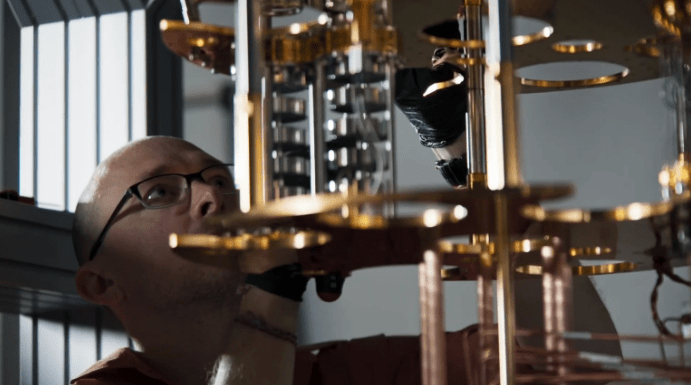
Microsoft this week commented on a recent decision by the U.S. Defense Advanced Research Projects Agency (DARPA) to renew funding for and advance to a second phase of a project under which Microsoft is among parties working to build a “utility-scale” quantum computer for the agency.
The work leverages topological qubits, “which are qubits with built-in error protection,” according to a post on the Microsoft Azure Quantum Blog. “The unique scalability of topological qubits is due to three important characteristics—they are small, fast, and able to be controlled digitally.”
The blog post by David Bohn, Hardware Partner, Microsoft Quantum, further stated that it sees DARPA’s decision to continue funding in the project as “lending confidence to the challenging but promising topological approach, and to Microsoft’s ability to design and build a scaled quantum supercomputer.”
Microsoft added that the next phase of the project calls for the company to create a detailed design for a Fault-Tolerant Prototype (FTP) of a quantum computer that uses its topological qubits approach. DARPA will later evaluate the FTP design and verify Microsoft’s scientific findings.
“The design for the FTP will identify the minimum performance requirements for all components and subsystems of this small-scale quantum computer, thus demonstrating the feasibility of building and operating a utility-scale quantum computer,” the blog post said.
“Microsoft’s FTP is intended to process information stored in multiple logical qubits, representing thousands of physical qubits, which would establish a baseline for a scalable quantum computer.”
This week’s comments by Microsoft come about two months after DARPA said it would be extending its project, and almost exactly one year after DARPA chose Microsoft, PsiQuantum, and Atom Computing for special project funding under the agency’s Underexplored Systems for Utility-Scale Quantum Computing (US2QC) program.
Dan O’Shea has covered telecommunications and related topics, including semiconductors, sensors, retail systems, digital payments, and quantum computing/technology for over 25 years.
- SEO Powered Content & PR Distribution. Get Amplified Today.
- PlatoData.Network Vertical Generative Ai. Empower Yourself. Access Here.
- PlatoAiStream. Web3 Intelligence. Knowledge Amplified. Access Here.
- PlatoESG. Carbon, CleanTech, Energy, Environment, Solar, Waste Management. Access Here.
- PlatoHealth. Biotech and Clinical Trials Intelligence. Access Here.
- Source: https://www.insidequantumtechnology.com/news-archive/microsoft-darpa-renewal-lends-confidence-to-topological-qubits-approach/
- :has
- :is
- 09
- 2024
- 25
- 385
- a
- ability
- Able
- About
- According
- added
- advance
- advanced
- After
- agency
- All
- among
- and
- approach
- ARE
- AS
- atom
- Azure
- Baseline
- BE
- Blog
- build
- Building
- built-in
- but
- by
- Calls
- captured
- categories
- challenging
- chose
- come
- commented
- comments
- company
- components
- computer
- computing
- confidence
- continue
- controlled
- covered
- create
- darpa
- David
- decision
- Defense
- Defense Advanced Research Projects Agency
- demonstrating
- Design
- detailed
- digital
- Digital Payments
- digitally
- due
- error
- establish
- evaluate
- exactly
- extending
- FAST
- feasibility
- Feb
- findings
- For
- from
- funding
- further
- Hardware
- High
- HTTPS
- identify
- image
- important
- in
- Including
- information
- inside
- Inside Quantum Technology
- intended
- IT
- ITS
- later
- leverages
- logical
- max-width
- Microsoft
- Microsoft Azure
- minimum
- months
- multiple
- next
- of
- on
- ONE
- operating
- over
- parties
- partner
- payments
- performance
- phase
- photo
- physical
- plato
- Plato Data Intelligence
- PlatoData
- Post
- posted
- process
- Program
- project
- projects
- promising
- protection
- prototype
- Quantum
- Quantum Computer
- quantum computing
- quantum technology
- qubits
- recent
- related
- representing
- Requirements
- research
- retail
- s
- Said
- Scalability
- scalable
- scaled
- scientific
- Second
- sees
- Semiconductors
- sensors
- small
- special
- stated
- stored
- supercomputer
- Systems
- Technology
- telecommunications
- that
- The
- this
- this week
- thousands
- three
- Thus
- to
- Topics
- true
- two
- u.s.
- under
- unique
- uses
- verify
- week
- which
- will
- with
- Work
- working
- would
- year
- years
- zephyrnet













